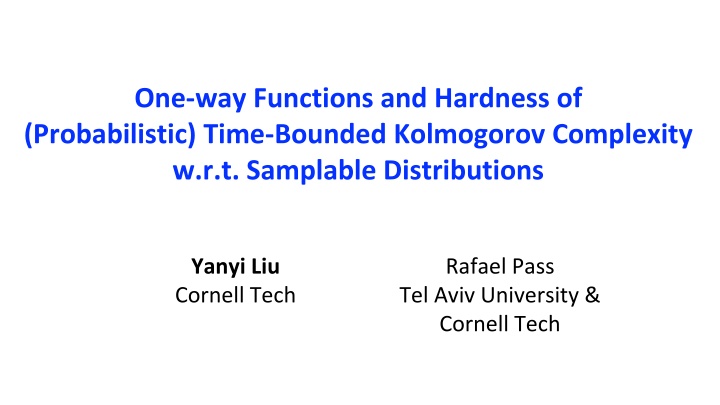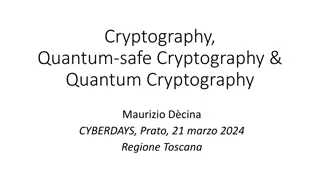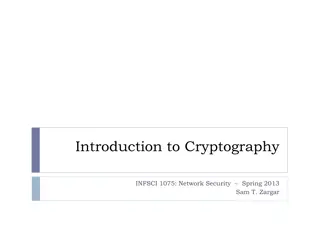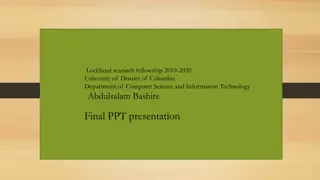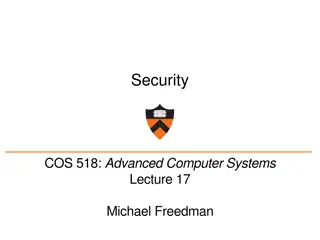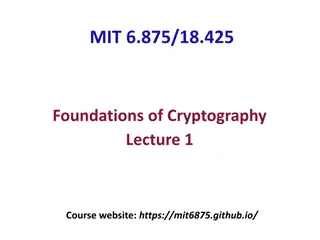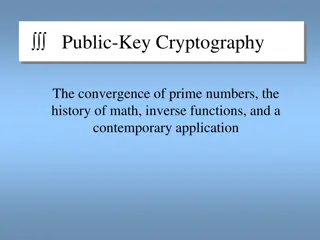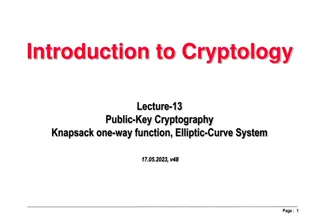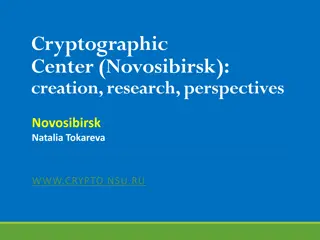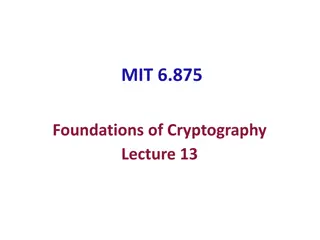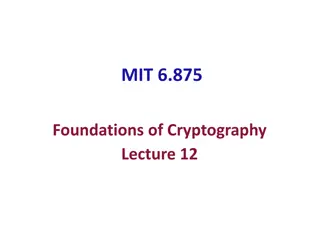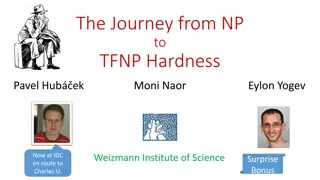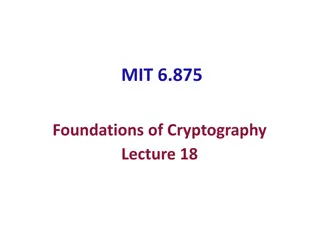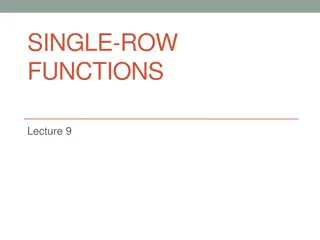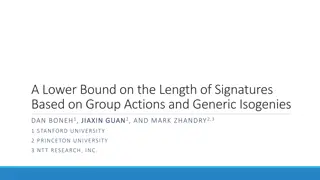One-Way Functions and Hardness in Cryptography
In the realm of cryptography, one-way functions play a crucial role due to their property of being easy to compute but hard to invert. This complexity relates to various cryptographic aspects such as private-key encryption, pseudorandom generators, digital signatures, and more. Kolmogorov complexity further delves into the concept of randomness in strings. Explore the significance of one-way functions, their existence, and implications in practical and theoretical settings.
Uploaded on Mar 09, 2025 | 1 Views
Download Presentation

Please find below an Image/Link to download the presentation.
The content on the website is provided AS IS for your information and personal use only. It may not be sold, licensed, or shared on other websites without obtaining consent from the author.If you encounter any issues during the download, it is possible that the publisher has removed the file from their server.
You are allowed to download the files provided on this website for personal or commercial use, subject to the condition that they are used lawfully. All files are the property of their respective owners.
The content on the website is provided AS IS for your information and personal use only. It may not be sold, licensed, or shared on other websites without obtaining consent from the author.
E N D
Presentation Transcript
One-way Functions and Hardness of (Probabilistic) Time-Bounded Kolmogorov Complexity w.r.t. Samplable Distributions Yanyi Liu Cornell Tech Rafael Pass Tel Aviv University & Cornell Tech
What is the Best Assumption? Hardness of Factoring? Discrete log? LWE? Lattice problems? OWF? NP is hard? Today: Science is hard! Our Focus: OWFs
One-way Functions (OWF) [Diffie-Hellman76] A function f that is Easy to compute: can be computed in poly time Hard to invert: no PPT can invert it easy y=f(x) x hard Ex [Factoring]: use x to pick 2 random large primes p,q, and output y = p* q
One-way Functions (OWF) [Diffie-Hellman76] A function f that is Easy to compute: can be computed in poly time Hard to invert: no PPT can invert it OWF both necessary [IL 89] and sufficient for: Private-key encryption [GM84,HILL99] Pseudorandom generators [HILL99] Digital signatures [Rompel90] Authentication schemes [FS90] Pseudorandom functions [GGM84] Commitment schemes [Naor90] Not included: public-key encryption, OT, obfuscation Whether OWF exists is the most important problem in Cryptography
Characterization of OWFs OWFs exist iff the time-bounded Kolmogorov-complexity problem is hard-on-average. [LP 20] A win-win perspective: Either OWFs, or efficient algorithms for optimal file compression, inductive reasoning, optimal machine learning But only over random instances! [Today] Over practical instances. E.g., Science is easy (over real-world data)
Kolmogorov Complexity [Sol64,Kol68,Cha69] Which of the following strings is more random : 1231231231231231231 1730544459347394037 K(x) = length of the shortest program that outputs x Formally, we fix a universal TM U, and are looking for the length of the shortest program ? = (M,w) s.t. U(M,w) = x Lots of amazing applications (e.g., Godel s incompleteness theorem) But uncomputable.
Time-Bounded Kolmogorov Complexity Which of the following strings is more random : 1231231231231231231 1730544459347394037 K(x) = length of the shortest program that outputs x Kt(x) = length of the shortest program that outputs x within time t(|x|) Can Ktbe efficiently computed when t is a polynomial? Studied in the Soviet Union since 60s [Kol 68,T 84] Independently by Hartmanis [83], Sipser [83], Ko [86] Closely related to MCSP (Minimum Circuit Size Problem) [T 84,KC 00] Meta-complexity : complexity of complexity of x
Average-case Hardness of Kt Frequential version [60 s, T 84] Does algorithm that computes Kt(x) for a large fraction of x s? Observation [60 s, T 84]: Ktcan be approximated within log n w.p 1-1/n Proof: simply output n.
Average-case Hardness of Kt Frequential version [60 s, T 84] Does algorithm that computes Kt(x) for a large fraction of x s? More general version: Given some (efficiently) samplable distribution D, Does algorithm that computes Kt(x) over x D w.h.p.? (Efficiently) samplable distributions: Distributions that can be sampled by a poly- time probabilistic TM. KeyGen(1^n) for most schemes Def: Ktis mildly-HoA w.r.t. D if there exists a polynomial p, such that no PPT heuristic H can compute Ktw.p 1-1/p(n) over x D for inf many n.
OWFs from Hardness of pKt [LP 23] Consider a probabilistic version of Kt, pKt, the following are equivalent: 1. OWFs exist 2. samplable D on which poly t, pKtis mildly-HoA. 3. On uniform distribution, poly t, pKtis mildly-HoA. pKtis a (recently introduced) notion of Kolmogorov complexity [GKLO 22] pKtcaptures what happens to Ktin the Common Random String model - The task: given a CRS, find the shortest program that outputs the string with CRS - It is the same (within O(log n)) as Ktunder standard derandomization assumption. [GKLO 22]
OWFs from Hardness of pKt [LP 23] Consider a probabilistic version of Kt, pKt, the following are equivalent: 1. OWFs exist 2. samplable D on which poly t, pKtis mildly-HoA. 3. On uniform distribution, poly t, pKtis mildly-HoA. (2) => (1) yields a strong and natural win-win situation: Either OWFs exist, or for any efficiently sampled x we can (w.h.p.) find short programs that print x -- an efficient approach implementing Occam s Razor
Either OWFs, Or Science is easy*! Occam s razor (1287-1347, John Punch 1639): Entities are not to be multiplied without necessity" Non sunt multiplicanda entia sine necessitate) Simplest explanation is mostly likely the truest *Assuming nature is efficient, collecting data is easy, ...
OWFs from Hardness of pKt [LP 23] Consider a probabilistic version of Kt, pKt, the following are equivalent: 1. OWFs exist 2. samplable D on which poly t, pKtis mildly-HoA. 3. On uniform distribution, poly t, pKtis mildly-HoA. Corr: (2) => (3) Uniform is the hardest distribution for pKt. Additional Remark: Our theorem also holds w.r.t. Kt, assuming E ioNSIZE[20.01n] (which implies AM = NP).
Related Work Ilango, Santhanam, and Ren [IRS 22] showed that Under a derandomization assumption, ioOWFs Ktis hard to ?(log n) approximate w.r.t. some samplable distribution We only require hardness of solving exact version of Kt. This is significant: Any distribution under which Ktis hard to ?(log n) approximate is itself a OWF.
Proof Overview [THM1] The following are equivalent: 1. OWFs exist 2. samplable D on which poly t, pKtis mildly-HoA. 3. On uniform distribution, poly t, pKtis mildly-HoA. (1) => (3): mostly following [LP 20] (3) => (2): trivial Focus: (2) => (1)
Proof Overview (2) => (1) Assume that samplable D on which pKtis mildly-HoA for all poly t, thenOWFs exist. For simplicity: we consider just Kt(without CRS) in this overview. Def: We say that a distribution D is Poly-bounded by Ktif D samples any string x w.p. <= poly(n) / 2K^t(x) - It does not assign too much weight to Kt-random strings. Examples: The uniform distribution. (2-n<= O(1) 2-K^t(x)) Any efficient deterministic distribution .
Proof Overview (2) => (1) Assume that samplable D on which pKt is mildly-HoA for all poly t, thenOWFs exist. Outline: Step 1. The LP20 OWF will be still (weak) one-way if we switch uniform to any distribution that is poly-bounded by Kt. Step 2. Any efficiently samplable distribution must be poly-bounded by Kt. (Not quite, either need assumptions or appealing to a CRS.)
Proof Overview (2) => (1) Assume that samplable D on which pKt is mildly-HoA for all poly t, thenOWFs exist. Outline: Step 1. The LP20 OWF will be still (weak) one-way if we switch uniform to any distribution that is poly-bounded by Kt. Step 2. Any efficiently samplable distribution must be poly-bounded by Kt. (Not quite, either need assumptions or appealing to a CRS.) Will follow from the Coding Theorem of [LOZ 22]
Step 1 Assume poly t, distribution D s.t. (1) D is poly-bounded by Kt; and (2) Ktis mildly-HOA. Then OWFs exist. Note: [LP 20] constructs only a weak OWF. Weak OWF: mild-HOA version of a OWF: efficient function f s.t. no PPT can invert f w.p. 1-1/p(n) for inf many n, for some poly p(n)>0. Lemma [Yao 82]. If a Weak OWF exists, then a OWF exists.
LP20 construction: Let c be a constant so that Kt(x) < |x|+c for all x Define f(? ? ,i) where |? | = n+c, |i| = log (n+c) as follows: Let ? = first i bits of ? (i.e., truncate ? to i bits). Let y = output of ? after t(n) steps. Output i||y. Assume for contradiction that f is not a Weak OWF. Then, for every inverse polynomial ? ?, there exists a PPT attacker A that inverts f w.p 1- ? ?. We construct a heuristic H (using A) that computes Ktw.p. 1- ? ? poly(n) over D, which concludes that Ktis not mildly HOA over D, a contradiction.
Heuristic H(y) proceeds as follows given y D : For i = 1 to n+c - Run A(i||y) -> ? and check if ? outputs y within t(n) steps Output the smallest i for which the check passed (or the program). Intuitively, if A succeeds with VERY high probability, then it should also succeed with high probability conditioned on length i, for EVERY i [n+c] But: the problem is that H is feeding A the wrong distribution over y s. Solution: using a relative distance argument in LP 20, we can show that they are not too far (in the paper).
A Brief Summary The following are equivalent: 1. OWFs exist 2. samplable D on which poly t, pKtis mildly-HoA. 3. On uniform distribution, poly t, pKtis mildly-HoA. A very strong and natural (poetic) win-win situation: Either crypto exists, or scientific discovery is easy. The first language (without RSR) admits the property that uniform is a complete distribution
Towards excluding Pessiland HoA refers to be HoA w.r.t. some samplable distribution pKt is HoA NP is HoA SAT is HoA OWF , it suffices to prove NP-hardness of pKt To prove (And this may even be necessary, assuming iO see [HIR 23]) Technicality: The reduction needs to be oblivious to t. But Hirahara [Hir 22] showed such a reduction for NP-hardness of MKtP*, so we are getting close!
